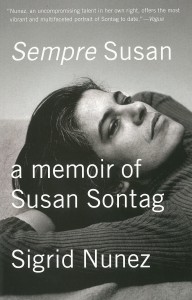I was introduced to the idea of Monica Sarsini this way: My college boyfriend— from Florence, Italy—said, “You have to meet my mother’s friend. She’s a writer. She’s strange and beautiful. She’s anorexic. She’s agoraphobic. She lives downstairs. You should read her.” He produced a slender book from his mother’s jammed shelves. The title was Crepapelle. A nonsense word. With peculiar childlike pleasure, he went on to describe the book as menagerie of fantastical hybrid animals. The dense sonorous other-dimensional language was too difficult for me, with my remedial Italian, to read at that time. But I took the book away with me, and kept trying.
I was introduced to the actual Monica Sarsini shortly after, when she held an open studio in her living room to show a friend’s paintings. She was beautiful and tiny, an exquisite skeleton. But unlike the haunted neurasthenic I had conjured, she was sunlight–laughing loudly, mouth open, teeth flashing. She grabbed both my hands firmly, fixed her face to mine and told me that she was absolutely delighted to meet me. I was nineteen and she embodied feminine perfection. Large black eyes, heavily lined with kohl, cheekbones like bird-wings, thick black hair pinned in a messy upsweep. She wore high heeled boots (always) but didn’t teeter. She clomped and stood her ground. She was ferocious, not sickly. It was months before I worked up the courage to speak in her presence.
After we’d grown close—once I’d recovered my tongue—she told me about books.
In particular she introduced me to Thomas Bernhard, who was her hero. She gave me
Gargoyles
and described the dark gloomy landscape, the trepidation of the child’s perspective. She allowed that it was a singularly depressing book, even though she loved Bernhard mostly because he was such a hoot, because he was perfectly mean. Despite being a firmly established figure in the tiny Florentine art scene, Monica was always deeply insecure about her art, and she easily found herself in his stern outlier sensibility. She told me the story of how she’d met him in 1982, when he came to Florence to accept the Premio Prato. He was reluctant to be there at all, and seemed, according to Monica, to have thought he could just come to the ceremony and collect the money. But they wanted to praise him at a fancy dinner; and they wanted him to say a few words. He came reluctantly to the podium, looked out at the room of expensively coifed cultural bankers, muttered “Too terrible” in English. And then he left.
For years, I’ve imagined her as a full participant in that scene. I imagine her picking Bernhard up at the Florence train station in her wrecked Fiat 500. I imagine him folding himself into the tiny seat next to her, barely noticing the floors littered with cigarette butts, the back seats pulled out to make room for her garish paper maché statues. I imagine them smoking Gauloises, the plumes wrapping Monica’s bodacious laughter and curling out the open windows as the car peddled down the freeway, in the breakdown lane, towards Prato.
The first full-length story of Monica’s that I translated into English was a broad interior essay about a car ride. The piece is titled “Sunday” and in it she explains how difficult it had become for her to venture out of the small neighborhood in the center of Florence where she lived:
If my mother asks what I’ve decided to do today, I don’t have it in me to answer that yet again she has thrown me into a state of panic; she beckons me and I can’t come to her. I haven’t been back to the countryside in years, and she doesn’t seem to notice that I spend Christmases, birthdays, anydays without them all because they won’t come to me; they wait for me to come, to meet them at the end of a road that I no longer know how to follow.
Her boyfriend’s new sedan is fast, comfortable, and quiet. She looks out the window silently, watching the landscape fall past. They have lunch in a tavern, right at the foot of the hill where her family’s country house sits. They visit a factory up the road from the country house. They while away the Sunday, but she remains unable to let him drive her up the dirt road to the country house, where her family spends Sunday without her.
Monica was never in fact agoraphobic. She didn’t like to leave her neighborhood, where she knew everyone on the street by name except tourists, who didn’t heavily frequent that quadrant of the city. She didn’t like to be so far from her home that she couldn’t retreat there in a few moments if panic were to seize her. But she wasn’t afraid of open spaces, per se, she was afraid of one old farmhouse, set on the slope of a mountainous hill, across the Arno, east of the city, halfway between the golden fields of Chianti and the ghostly pine forests of Vallombrosa. Her childhood home, Miransú. The name means “look up.”
I didn’t start seeing Monica regularly until my senior year of college. I’d decided to translate her stories as my senior honors thesis. I spent that winter break at the home of a subsequent boyfriend, seeing Monica every three days or so in order to work with her on the translations. We’d sit on her couch in her new apartment, just across the ring boulevard from her old apartment, for hours on end side by side, drinking sweet black coffee, smoking cigarettes, eating eggs poached in tomato sauce, parsing out twisted Italian syntaxes and discussing the meanings of words in tremendous deep detail. She was exacting about her word choice and wildly untamed in her grammar—a comma was a breath, a semi colon two, a period was a breath with a rest and a new paragraph was a long breathless leap. We spent an hour discussing the word “feritoia”—the untranslatable title of one of her stories. A feritoia is a narrow vertical opening in the side of a fortress, slanted at just such an angle so that a soldier can see the enemy approach, or shoot an arrow or firearm, yet remain totally protected behind the thick stone wall. My translation dictionary offered “slit”—and we both knew that it wouldn’t do. “Feritoia is defensive,” she explained. “A position of power.” Monica was hidden behind a feritoia.
When I defended my senior thesis, my panel said sympathetically, “How dreary, Minna.” “How terrible for you,” said my Dante professor, “to have to sit in this work for the last year.” I flashed to the image of Monica next to me, confiding, laughing, her long narrow fingertips fluttering up to her collarbone. Monica’s poetic writing was almost too difficult for me to read without translating it. “Not really,” I told the panel. I had loved that year of trying to become someone else through language. I loved trying to understand a person through her words.
It was an honor that she had trusted me, so young, to translate her story. “Broken Birds” was the thesis title I had settled on once I realized that I was still too inexpert a writer to do justice to her idiosyncratic wordplay. Her magical animals with their hybrid genders and Linnaean equivalences were beyond me. An entire series of titles—Crepapelle, Crepapancia, Crepacuore—too precise for me to surrender to their English counterparts. Crepa means “to die”—a withering away kind of dying, but with slangy diction—“croak”… “kick bucket.” Compound words that come out to something like: “Dead-Rot-Skin,” “Dead-Rot-Belly,” “Dead-Rot-Heart.” Instead, “broken birds” was a single phrase lifted from the collection’s central story, “Lapo.” At thirteen her older brother had been accidentally shot in the head by a neighbor boy, and the family, her mother and father, collapsed around Lapo’s hospital bed, like so many broken birds.
Lapo had died the day before Christmas. He’d been shot while climbing an olive tree in the grove that rolled down the slope from the old farmhouse that Monica was afraid to go to. By the time I came back to Italy after college, though, she had determined to overcome that fear and return to Miransú. She was in a new house, even farther from the city center and the neighborhood where I’d first met her. She lived with her boyfriend in a single floor apartment on a road leading out of the city toward the Etruscan hill town of Fiesole. The living room opened up onto a massive stone balcony overlooking the vineyards and olive groves of the great estate next door. Plunging herself into that provocative setting was part of a strategy to get back to the olive groves of her childhood.
Monica was always strategizing. I realize now that it was one of the most energetic components of her character. Days after I’d landed back in Florence, with a college degree in Italian literature and occasional part-time work affixing subtitles to movies to be shown at film festivals, Monica proposed that we go into business together. The local Communist Women’s Center was inviting suggestions for evening courses, and she wanted to teach creative writing. I had ten pages of a teenage angst story and some critical theory as credentials. But, as Monica saw it, I’d taken two semesters of creative writing in college and so I knew how an American workshop ran. The fact that I still stumbled grotesquely when I spoke or, God forbid, wrote Italian was an incidental concern. All the confidence I lacked, Monica had tenfold on my behalf. She wanted me next to her; it was the only way she’d have the courage to do this. And we both needed money, she pointed out.
Yet again I was drawn reluctantly into a situation by the magnetic force of someone needing me. In this perhaps singular instance it was a total success. At that time, we were the only creative writing workshop in Italy. People came from great distances to study with us. There was a pharmacist from Pisa, an enlisted soldier from Bologna, a postal worker from Fiesole (who for some urgent reason I can’t recall, I convinced to read The Spirit Catches You and You Fall Down in English), and a bilingual Oxford graduate who wrote exquisite set pieces about her cat—sometimes mixing her two languages into her own private patois. Monica, with her reverberating laugh and bottomless stores of compassion, was the charismatic; and I, with my permanently furrowed brow, brought gravity to the scene. Our students were happy; those two hours every Wednesday evening lifted people out of their lives, made them feel connected to something beyond pharmacies and barracks and postage, made them feel heard and important. That was Monica’s great gift.
And then I decided to move to New York City to go to graduate school. Monica was sad, jealous, and angry. And I was young and cavalier and didn’t understand her feelings for what they were. I didn’t, in fact, understand them at all. My guilt was free-floating. My discomfort was chilling. I didn’t understand that I was leaving her behind. I was going to “pursue writing” on some—albeit bogus—higher level. I was going to New York when she couldn’t even go to Pisa. I was flying away. I was young, twenty years younger, so I could just go if I wanted to. But to Monica was breaking a pact, a partnership, an intimacy that I fallen into happily but by accident.
Every time for the next few years that I would come back for a visit—a summer or Christmas break—she would embrace me warmly and then we would sit together as if on a stage while she formally, sometimes snidely, inquired how my new life was going. She would increasingly crowd our visits with other friends, the permanent women of Florence: deeply politicized, smoky women with functional haircuts, expensive jewelry and heavy bosoms. Under their auspices she kept the creative writing classes going. For the first year, she kept an empty chair beside her where I would have sat. Into the second year, she still billed the classes under both of our names.
We settled into a groove of love and almost open resentment. Monica would regularly send me her new work, asking me to translate it, to get it published. Meanwhile, the more deeply I implicated myself in the world of New York publishing, the shyer I felt about my work and I shared it less and less readily, while also being desperate to publish myself.
Six years passed. I decided with my boyfriend to move back again to Italy, to sit in the middle of the remotest end of Tuscany, in a cramped, under-heated house, live on olive oil and tomatoes, and write books.
There were three critical changes in this prodigal moment: First, I was bound like glue to this subsequent boyfriend, as I’d never been to a man before. Second, Monica adored him almost from the start and he also loved her—and so I had returned, at last, but the days of me and Monica, together alone, talking about books and writing were irretrievably past. Third, and perhaps most importantly, because it represented the end of one chapter and the beginning of another, Monica had in the intervening years, made her way back to Miransú.
Monica has been a bell, ringing loudly at each station of my coming of age. And as absorbed as I’ve been with myself, or how she’s felt about me, I haven’t been able to see how our friendship reflects my passing. How I move through life like a dervish and she chimes from her fortified tower.
That November we all went together to pick olives at Miransú. I’d translated that house, building a picture of a place I’d never been through Monica’s darkest and fondest memories. The grand stone kitchen with a fireplace you could almost stand up in. A heavy white curtain in the doorway to a living room that stands eternally waiting for Christmas morning. A wooden desk in a small sitting room with high ceilings and painted wooden furniture—the window that looks from there out over the stone driveway, and past that to the wickedly steep hillside, littered with fat ancient olive trees. The chicken coop out the side door; enormous vats of oil stacked to the side of the tractor garage with the caretaker’s apartment above it. Large shallow wood slated boxes, heavy with fresh olives—meticulously layered so that they wouldn’t get squashed under their own weight. The air greasy with the peppery perfume of olive juice.
Picking olives with Monica and her family at Miransú was beautiful. She was there at last, and peaceful. She’d gathered all the courage she had to come back; and then once she’d made the leap, her heart blossomed. We were happy too. We worked hard and then feasted on bread blackened in the giant kitchen fireplace, rubbed with garlic and soaked in tangy fresh olive oil. Everything came together around a dark wooden table in a vast stone kitchen in a farmhouse on a hill in Tuscany. That fall was more than a decade ago.
That time, the last time, that I left Monica and Florence, I was on the cusp of real adulthood: my book was about to be published, my boyfriend and I were going to be married, start a family. We said we would all come back soon and pick olives at Miransu’. I haven’t spoken again to Monica since I finished that book and brought it back to America, since my boyfriend and I married and divorced. The drama and anger. The missteps. She hasn’t seen pictures of my children. She doesn’t know where I live anymore. “Too terrible.”
It’s very easy to find pictures of Monica online. She’s gotten involved with teaching writing to women prisoners and an anthology she published of their work brought her a lot of attention. There are pictures of her presenting the book in the city’s lavish library. She goes into schools and teaches writing and art to children. She teaches them how to make fantastical animals out of colored tissue paper, wire and paste. There are pictures of her holding up their creations, her face lit up with delight at what children invent. It was a shock to see her—my image of her frozen a decade ago—maybe even a decade before that when I first met her. She was my age then. Now she is sixty. My mind’s picture of her has shattered. I would be ashamed to tell her how I’ve spun so far from her, from what she gave me, the trust she put in me, ashamed to recover that lost time.




